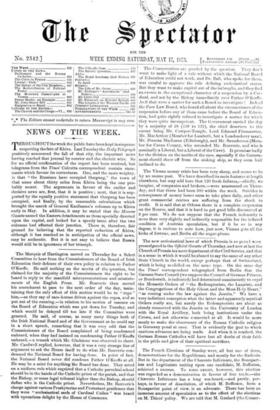The Marquis of Hartington moved on Thursday for a Select
Committee to hear from the Commissioners of the Board of Irish Education their defence of their own policy in relation to Father O'Keeffe. He said nothing on the merits of the question, but claimed for the majority of the Commissioners the right to be heard in reply to the manifold misrepresentations and misstate- ments of the English Press. Mr. Bouverie then moved his amendment to pass to the next order of the day, main- taining that the only effect of this motion would be to " rope " him,—as they say of race-horses driven against the ropes, and so put out of the running,—in relation to his motion of censure on the Board of Education which was put down for Tuesday, and which would be delayed till too late if the Committee were granted. He said, of course, as many nasty things both of the Irish National Board and of the Government as he could say in a short speech, remarking that it was very odd that the Commissioners of the Board complained of being condemned unheard, when they had insisted on condemning Father O'Keeffe unheard,—a remark which Mr. Gladstone was observed to cheer. Mr. Cardwell replied, however, that it was a very strange line of argument to ask the House itself to do what Mr. Bouverie con- demned the National Board for having done. In point of fact, the National Board never did condemn Father O'Keeffe at all. He may be a saint for anything the Board has done. They acted on a uniform rule which required that a Catholic parochial school should be in the hands of the Catholic priest of the parish, and that the Bishop, or some legal tribunal higher than the Bishop, should define who is the Catholic priest. Nevertheless, Mr. Bouverie's charge against various Presbyterian and Protestant gentlemen that they were " ecclesiastical serfs of Cardinal Cullen " was heard with uproarious delight by the House of Commons.


































